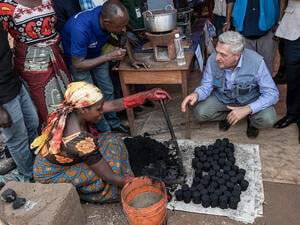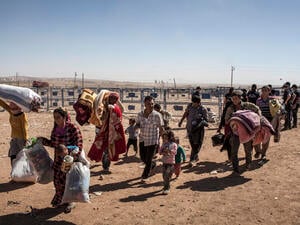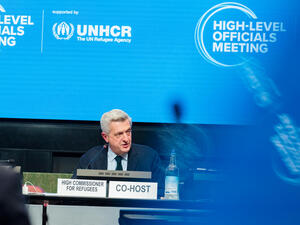World leaders voice strong support for new refugee deal at UN General Assembly
World leaders voice strong support for new refugee deal at UN General Assembly

South Sudanese refugee Peter Batali runs a community initiative that helps young Ugandans access online learning platforms. Uganda allows refugees to work, start businesses and own property.
NEW YORK – UNHCR, the UN Refugee Agency, hosted a gathering with political leaders from four continents, including Bangladesh, Costa Rica, Turkey and the World Bank today at the UN General Assembly High Level Week in support of the international agreement known as the global compact on refugees, a robust and systematic model to improve the lives of refugees and their host communities.
The global compact is expected to be endorsed by members of the UN General Assembly in December 2018, after two years of intense consultations UNHCR has led with UN member states, international organizations, experts, civil society, and refugees.
The UN High Commissioner for Refugees Filippo Grandi praised the role of host countries as first responders to refugee emergencies, like Bangladesh, Uganda, Niger or Mali, among others.
“These countries have kept their borders open at a time when in the world this is not something that we can take for granted anymore,” Grandi said. “We are facing an increasing tendency to reject, to close, to push back.”
"Host countries have kept their borders open at a time when in the world this is not something that we can take for granted anymore."
2017 saw record figures of forced displacement — 68.5 million people worldwide were forced to leave their homes, of whom 25.4 million became refugees in other countries.
Almost nine in 10 of the world’s refugees are hosted in developing countries, where they often live in remote areas with significant development challenges. The impact on local services, infrastructure and resources “is colossal,” Grandi said.

UN High Commissioner for Refugees Filippo Grandi greets Bangladesh Prime Minister Sheikh Hasina at a High Level Meeting on the Global Compact for Refugees in New York.
The global compact envisions specific measures benefiting both refugees and hosts, such as strengthening the hosting country’s health and educational infrastructure, as well as potentially revitalizing economies.
The prime minister of Bangladesh Sheikh Hasina shared the experience of how the country has been helping Rohingya refugees fleeing persecution in the neighbouring country of Myanmar.
Bangladesh has received over 727,000 Rohingya refugees in one year and it has allocated 600 acres of land to provide shelter, as well as covering their basic needs. “The resources invested in the Rohingya refugees have taken a toll on our environment and our economy,” Hasina said.
"Inaction is not an option.”
The Bangladeshi leader stressed the need for the international community to “share the burden” of the global refugee crisis. “World leaders must come forward with political will and commitment,” she added.
“No government has the right to ignore this problem,” said the Turkish minister of Foreign Affairs Mevlüt Çavuşoğlu.
Çavuşoğlu pointed at the crisis in the Mediterranean sea, where over 1,600 people have already died in 2018 trying to reach Europe. He advocated for “sustainable solutions to the migration crisis” like the global compact on refugees. “The current situation is unsustainable. Closing borders is not the right answer,” he said.
“Refugees and migrants contribute to economic development and enrich cultural diversity,” said the vice-president of Costa Rica Epsy Campbell Barr. The Central American country has been experiencing a rising flow of refugees from Nicaragua in recent months.
Barr reminded the representatives in the room of their shared responsibility: “A small country like ours is committed to the systematic efforts of receiving dozens of refugees daily. We anxiously look forward to the adoption of these global agreements.”
“We need to remember that this is about people, about refugees who dream of better lives for themselves and their families.”
The global compact also envisions measures such as resettlement and other pathways to third countries to help ease pressures on the countries hosting the largest numbers. The High Commissioner expressed concern about the shrinking figures of resettlement admissions. “We must reverse that course,” Grandi said. “It is another expression of solidarity.”
The involvement of development actors is key in the success of the global compact. The president of the World Bank Jim Yong Kim described the international agreement as “an example of how multilateralism can and should work.”
Kim highlighted that 52 per cent of refugees worldwide are under the age of 18 and “the consequences of inaction will haunt us for generations.”
“We need to remember that this is about people, about refugees who dream of better lives for themselves and their families,” he added. “And host communities, the vast majority of which are in low and middle-income countries that themselves aspire to grow and thrive.”
The process leading to the global compact on refugees was set in September 2016 when the UN General Assembly adopted the New York Declaration for Refugees and Migrants, which gave UNHCR the task to develop a ‘compact’ based on those consultations.
The new international agreement also builds on important lessons from applying a new vision for a more comprehensive response to these crises, known as the Comprehensive Refugee Response Framework (CRRF), in 15 countries.
The experiences shared in the ECOSOC chamber suggested huge promise in the new comprehensive approach underpinning the global compact to be considered by the General Assembly before the end of the year.
“Inaction is not an option,” said the president of the UN General Assembly Maria Fernanda Espinosa.
Grandi urged the country leaders in the room: “Help UNHCR say to the international community that better ways exist to deal with something many consider an intractable problem. We owe it to millions of uprooted and displaced people and we owe it to their generous hosts.”








